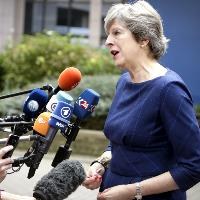(BRUSSELS) – Despite an appeal by the British prime minister, a breakthrough on the Brexit talks was not forthcoming on the second day of an EU summit that focused on migration, digital Europe, defence, and external relations.
Today the EU leaders in EU 27 format called for more progress regarding citizens’ rights, the Irish border, and financial obligations. They also agreed to start internal preparations for the second phase of the Brexit talks.
Yesterday’s meeting concluded with EU leaders agreeing that their migration strategy, which aims to restore control of external borders and to reduce arrivals and the number of deaths at sea, was bringing results and should be consolidated.
“Leaders agreed to offer Prime Minister Gentiloni stronger support for Italy’s work with the Libyan authorities,” said Council president Donald Tusk: ” We have a real chance of closing the Central Mediterranean route.”
But they also highlighted the need for ‘vigilance on all migration routes and readiness to react to any new trends and developments’.
The summit called for further action, including: support for directly affected EU countries; strong cooperation with countries of origin and transit, including with Turkey and the Western Balkans; further efforts to increase returns; applying the necessary leverage by means of EU policies, such as trade or development, to improve return rates and prevent illegal migration.
EU leaders made clear their continued support for the Schengen system, saying they would “get back to Schengen” as soon as possible, taking into account security interests of EU countries.
Illegal arrivals decreased by almost 70% on the Central Mediterranean route in the third quarter of 2017 compared to the same period in 2016, thanks to the efforts of the EU and its member states, especially Italy.
The leaders promised to work with Libya and its neighbours to boost border controls and support local communities along the migratory routes in Libya; increase efforts to establish a permanent EU presence in Libya; and provide adequate and targeted funding for migration-related projects in North Africa.
On Digital Europe, the European Council examined how the EU can seize the opportunities and address the challenges posed by digitalisation. They agreed on a series of priorities to build a successful digital Europe, such as:
- bringing governments and public sectors fully into the digital age
- completing the digital single market strategy by the end of 2018
- building a first rate infrastructure and communications network
- adopting a common approach to cyber security
- stepping up efforts to combat terrorism and online crime
- achieving an effective and fair taxation system fit for the digital era
The European Council called on the institutions to step up the legislative work, and on the member states to implement EU legislation and take all the necessary measures to shape the new digital era.
On defence, EU leaders resumed discussions on the permanent structured cooperation (PESCO) on defence, with a view to launching by the end of the year.
Regarding the European defence industrial development programme, the European Council called for an agreement to be reached within the Council by the end of this year.
The European Council also welcomed the launch of the trial run of the coordinated annual review on defence (CARD) aiming to enhance defence cooperation in the EU.
On external relations, the Council called on DPRK to abandon its nuclear and ballistic missile programs, stressing that lasting peace and denuclearisation of the Korean peninsula must be achieved through peaceful means.
And the leaders reaffirmed their full commitment to the Iran nuclear deal and endorsed the statement by the Foreign Affairs Council of 16 October 2017.
European Council (Art. 50) conclusions, 20/10/2017
European Council conclusions on migration, digital Europe, security and defence, 19/10/2017


